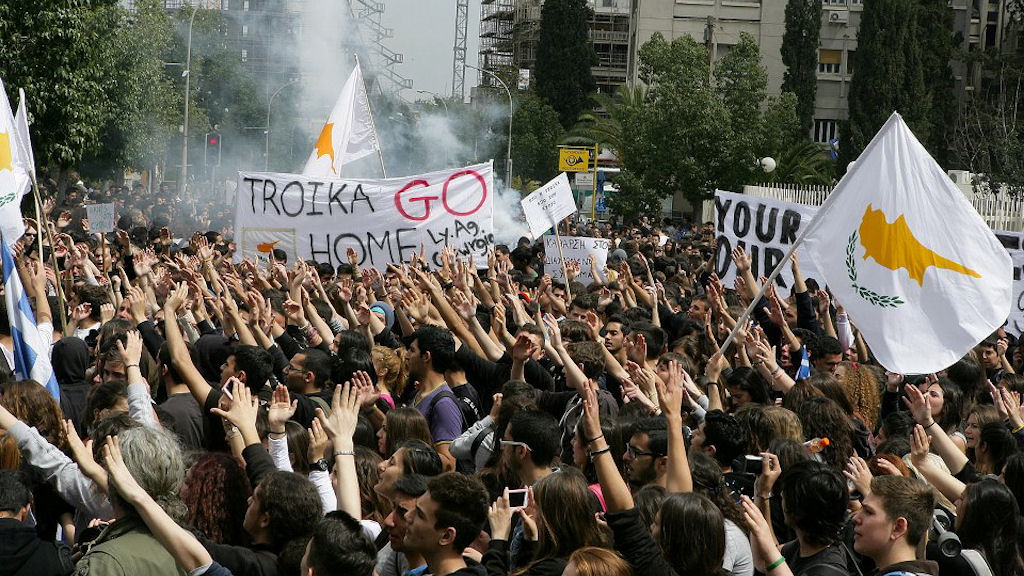Cyprus: ‘We are the generation of 500 euros’
Just over six months on from the Cyprus bailout, what’s the situation like for people on the ground? Grim, says our newest “Austerity Kid”, 24-year old Maria Christodoulou.

In March this year, tiny Cyprus – and its bloated banking sector – became the latest eurozone country to be forced into a bailout by the “troika” – the European Union, the International Monetary Fund and the European Central Bank.
People took to the streets, with children protesting that their futures were being stolen by austerity, but ultimately the island swallowed its economic medicine: a €10bn rescue package in return for a raid on bank accounts containing more than €100,000, alongside cash withdrawal restrictions and, of course, austerity measures.
These have taken the form of tax rises and strict cuts, including to salaries, government budgets, and jobs. It has all taken a heavy toll on the Cypriot economy, as well as its people.
I am almost 25 years old and I have zero euros in the bank. How can I keep dreaming for a better future? Maria Christodoulou, Cyprus
Andreas Theophanous, president of the Cyprus Center for European and International Affairs at the University of Nicosia, summed up the mood in a September briefing paper.
“In reality what has happened is an unprecedented attack on Cyprus’ financial sector that takes the country back decades. The euro group decisions have paralysed the financial system of the country… Effectively, the troika decisions have pushed Cyprus from a recession to a depression,” he wrote.
‘We can’t move forward’
Unemployment is one of the biggest problems: it jumped by 43 per cent in the last year, the fastest increase in the European Union. In May 2013, it was 16.3 per cent. For young people, it’s even worse – closer to 30 per cent.
Maria Christodoulou, a 24-year-old Cypriot living in Nicosia, told Channel 4 News’ Austerity Kids project that the situation felt hopeless.
“It’s not only young people, but it is more hard for us because we have just finished our studies, we have dreams, but we can’t move forward because of the crisis,” she said.
When Maria finished her degree in 2010, which she took in Crete, she struggled to find a job.
“No-one hired me as a teacher because I didn’t have any experience, so I started looking for another kind of job. As an example, secretary. No-one hired me as a secretary because I was overqualified, they said,” she said.
In common with many young people, she went back into education, completing her masters degree in journalism in June this year. But the situation has only got bleaker since her last job hunt.
Read more about the plight of young people across Europe in the Channel 4 News Austerity Kids project
In some ways, Maria is one of the lucky ones; she was accepted on a government programme for young people to get work experience, alongside a small salary of 500 euros a month.
But she says no-one can live on that: “We are the generation of 500 euros. Who can live in Cyprus for 500 euros? I can’t but I am trying.”
She said people are so desperate for jobs that they can’t complain or leave even if conditions are difficult.
“The problem is that they exploit us and we can’t support our job rights because we don’t want to lose our job. The answer from employers if you complain about something is: ‘You don’t like it? Go somewhere else if you can!’ because they know that it is very difficult to find a job nowadays.”
She said for many people in her generation, their hopes for the future have died.
“I am almost 25 years old and I have zero euros in the bank. How can I keep dreaming for a better future?” she asked.
Get involved in Austerity Kids
Get in touch: email us on austeritykids@itn.co.uk, tweet us @austeritykids or with the hashtag #austeritykids, or post on our Facebook or Google+ pages.